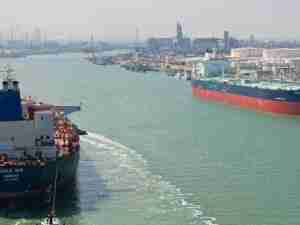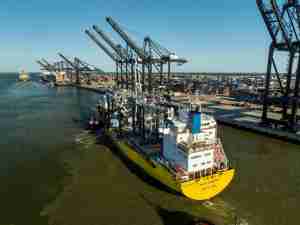President Biden will pay a visit to the Port of Baltimore on Wednesday morning following the passage of the Infrastructure Investment and Jobs Act (H.R.3684), according to the White House. The bill was presented to the President on November 8, following ten months of intensive advocacy and drafting.
The American Association of Port Authorities (AAPA)—the unified voice of seaports in the Americas—is grateful for a successful culmination of the hard work of lawmakers, port leaders, and transport industry partners.
President Biden's using a U.S. seaport as the backdrop for the very first stop on his celebration tour reflects the importance of the legislation for ports:
This Federal legislation is a win for maritime ports across the U.S. and the effects of this more than $5.2 billion in direct funding for seaports will bolster programs like the Port Infrastructure and Development Program (PIDP), which will fund port equipment and facilities improvements; the Army Corps of Engineers Coastal Navigation Program, which will dredge and maintain Federal coastal navigation channels; and initiatives like Marine Highways funding, on- and near-dock rail infrastructure and safety funding, and emissions reduction upgrades—just some of the benefits of this infrastructure bill.
AAPA’s President and CEO, Chris Connor, was quoted, “This bipartisan bill is a benchmark in American infrastructure policy. The goods that flow through our ports touch every state, every Congressional district, every neighborhood, every home in our country. Our ports move the economic blood in our veins.”
He acknowledged that, “The Federal funding for ports in this bill is a big step in the right direction. The idea of dedicated Federal funding for ports is only two years old, and now the Federal Government is updating our national freight policy.”
The United States moves more than 90 percent of internationally-bound cargo through its seaports. Over six million manufacturing jobs depend on exports, which equates to one in four manufacturing jobs in the U.S. More than 650,000 Americans work at port facilities and each state depends on an average of 15 seaports to handle imports and exports of goods worth over $6 billion each day. The cruciality of U.S. seaports to transport freight and to create and sustain jobs across the country is undeniable.
“Ports are working around the clock to squeeze the proverbial eleventh gallon of cargo into a ten-gallon bucket - the supply chain crunch is the real-time result of deferred national investment. Infrastructure expansion takes time, but this bill allows ports to get to work," Connor said.
Over time, the Infrastructure Investment and Jobs Act will accommodate the persistently growing international freight volumes in the U.S. and strengthen supply chains. However, AAPA is never finished advocating behalf of seaports, and will continue to push for broadened funding and reduced bureaucracy in the next round of infrastructure legislation.
AAPA and its members applaud Congressional champions of the two-year-old PIDP grant program, including Senators Cantwell (D-WA), Wicker (R-MS), Schatz (D-HI), and Collins (R-ME), along with Representatives DeFazio (D-OR-4), Graves (R-MO-6), Price (D-NC-4), and Diaz-Balart (R-FL-25). The bipartisan support for port funding is critical to keeping freight infrastructure working for all Americans, no matter the party, state, or region.
Though this bill's upgrades are doubtlessly needed, this is only the beginning. AAPA is working tirelessly to fund, improve, and fortify supply chains and seaports for generations to come.










